
Claude AI's voice control option could make keyboard, mouse obsolete
What's the story
Anthropic's Claude artificial intelligence (AI) chatbot is about to change how we interact with computers.
The AI assistant now comes with voice control, courtesy of Hume AI's Empathic Voice Interface (EVI) 2 model.
The new tech, as the name suggests, hopes to replace mouse clicks and keystrokes with more natural and emotionally intelligent conversations.
Empathy
A collaboration centered on emotional intelligence
The Anthropic-Hume AI partnership is all about making Claude understand voice commands, read emotions behind them, and respond appropriately.
EVI 2 converts spoken words into text for Claude to perform actions like moving the mouse or clicking buttons.
What makes this system unique is its emotional intelligence. For example, if a user requests help with their to-do list sounding stressed, Claude may respond soothingly, offering technical and emotional support both.
Tech trend
Rising interest in voice-controlled AI assistants
The advancements in Claude underscore the tremendous progress achieved in voice-controlled AI.
Unlike previous assistants from Amazon and Google, which often faltered when facing interruptions or topic changes, Claude and EVI offer more dynamic and adaptive interactions.
This fits into a larger trend where AI assistants are becoming more conversational, and capable of handling complex tasks.
Inclusive design
A boon for accessibility
Beyond convenience, the innovation of voice-controlled AI has practical applications for accessibility.
Hands-free control can make technology more user-friendly for individuals with disabilities or those multitasking.
By enabling natural interactions, Claude and EVI have opened up new possibilities for inclusive design in technology.
Hurdles
Challenges and potential risks of voice-controlled AI
Despite its potential, voice-controlled AI comes with challenges.
Mistakes by AI, aka hallucinations, might lead to unintended actions if Claude misinterprets a command/gains control over sensitive files.
Privacy concerns also loom large, as voice interactions may record data equivalent to browsing history or keystrokes.
Balancing innovation with security and trust will be crucial for the technology's success.